Key takeaways
- Descartes’ Method of Doubt encourages deep questioning of beliefs, transforming initial discomfort into a framework for deeper understanding.
- The approach promotes critical thinking and intellectual humility by challenging assumptions and enhancing the ability to analyze information.
- While beneficial, the method poses challenges such as skepticism paralysis and emotional distress, requiring a balance between doubt and constructive reasoning.
- Personal reflections reveal that embracing doubt can sharpen critical thinking while also necessitating careful navigation to avoid excessive second-guessing.
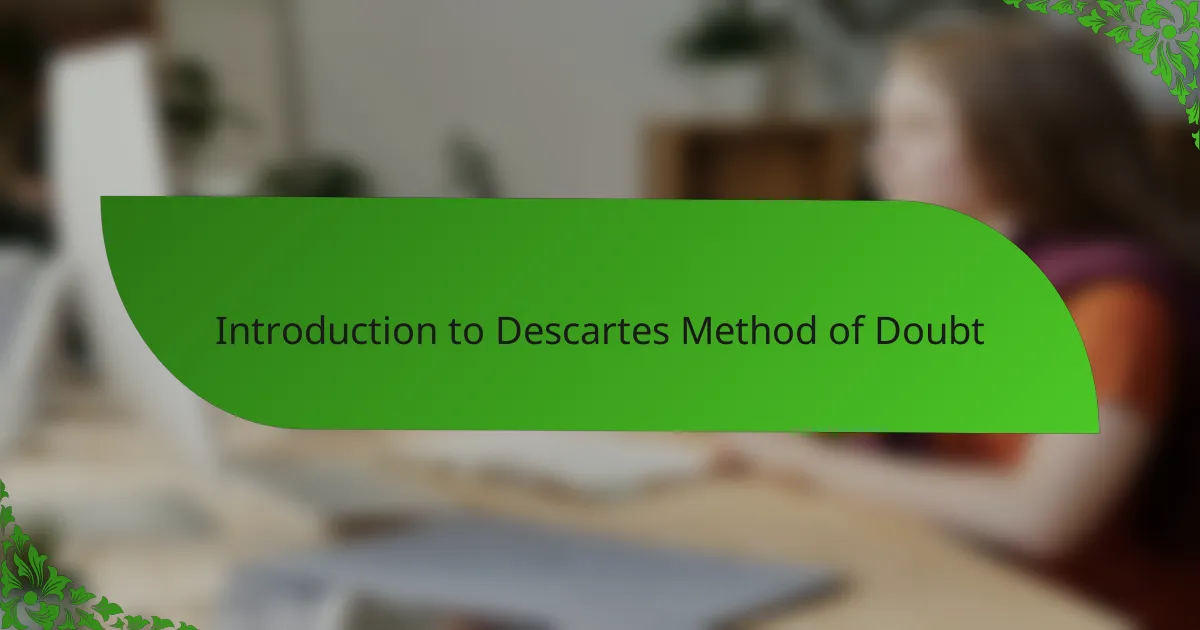
Introduction to Descartes Method of Doubt
Descartes’ Method of Doubt pushes us to question everything we think we know. At first, this approach felt unsettling to me—almost like dismantling the foundation beneath my feet. But isn’t that exactly what we need to do to discover what’s truly certain?
I remember struggling with this method when I first encountered it in my philosophy class. The idea that we should doubt even our senses seemed counterintuitive. Yet, this forced skepticism opened a path to deeper understanding, making me realize how often I accepted things without question.
What if everything you believed was just an assumption? Descartes challenges us with this very question, encouraging a radical process of inquiry. His approach isn’t about despair but about finding an unshakeable ground for knowledge.
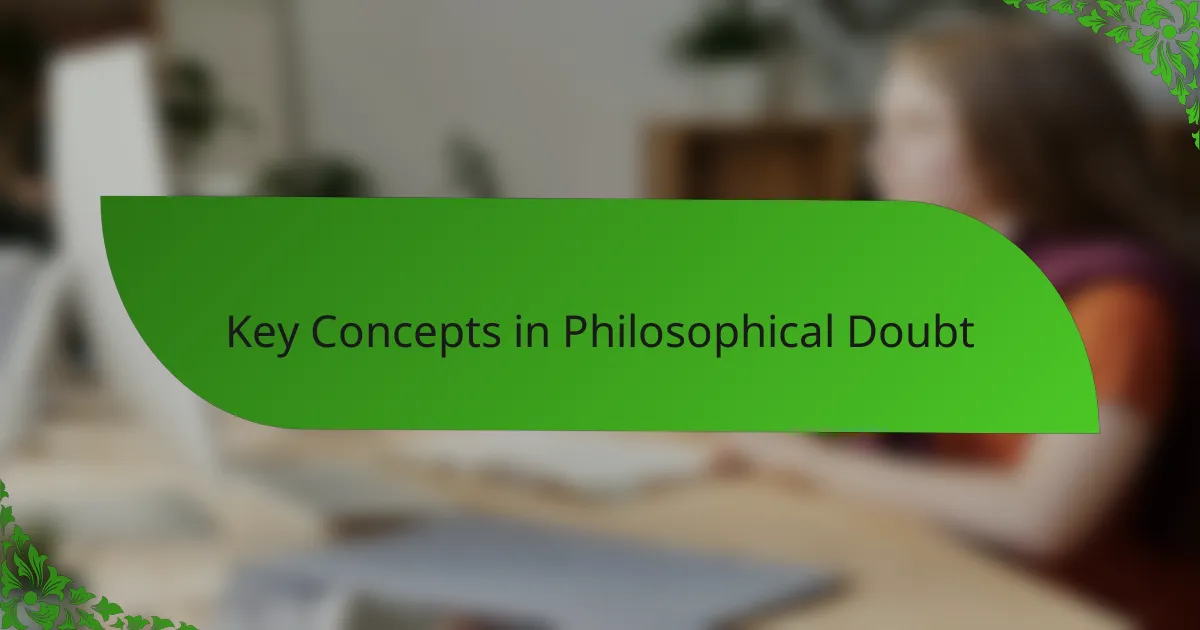
Key Concepts in Philosophical Doubt
One of the key ideas in philosophical doubt is the notion of suspending judgment. I remember feeling uneasy as I tried to withhold belief in things I once took for granted. It’s a strange space to be in—neither accepting nor rejecting, just pausing to reflect deeply on what’s really reliable.
Another concept that struck me was the “evil demon” hypothesis Descartes proposes. Could a powerful deceiver trick me into believing falsehoods? This thought experiment felt unsettling but also strangely freeing. It made me realize how fragile my sense of certainty truly is, urging me to seek something impossible to deceive.
Then there’s the famous idea of the “cogito,” or “I think, therefore I am.” It appears as the first indubitable truth emerging from doubt. I find it fascinating how Descartes transforms radical skepticism into a positive affirmation—showing that questioning itself proves our existence. Doesn’t that give doubt a surprisingly constructive power?
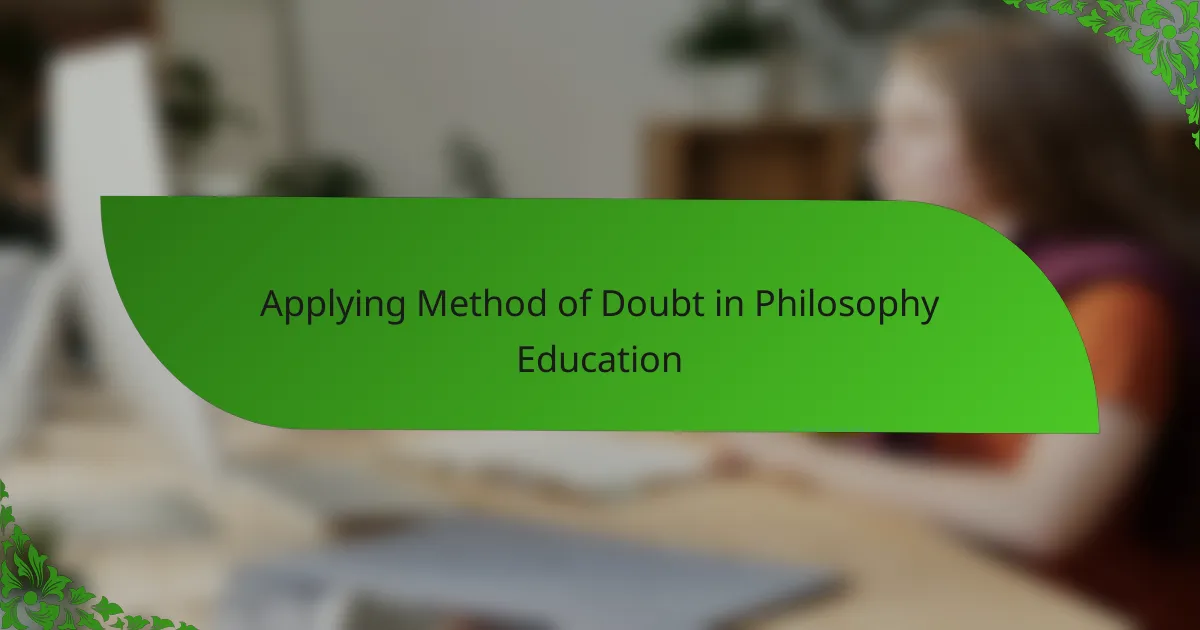
Applying Method of Doubt in Philosophy Education
Applying the Method of Doubt in philosophy education has, in my experience, transformed the way students engage with ideas. Instead of passively absorbing information, they learn to actively question and test the reliability of what they hear and read. This shift encourages critical thinking and prevents blind acceptance, which I believe is essential for genuine philosophical inquiry.
I recall moments when students initially resisted this skepticism, fearing it might lead to confusion or uncertainty. But once they embraced the process, curiosity took over. They started to appreciate how doubt isn’t about rejecting knowledge outright but about refining and deepening understanding. Isn’t it empowering to realize that questioning can actually build stronger knowledge rather than weaken it?
Using the Method of Doubt also offers a practical exercise for developing intellectual humility. When learners acknowledge the limits of their certainty, they open themselves up to new perspectives and ideas. This mindset, I’ve found, is crucial not just in philosophy but in navigating life’s complexities, making the classroom a space where doubt becomes a tool for growth rather than frustration.
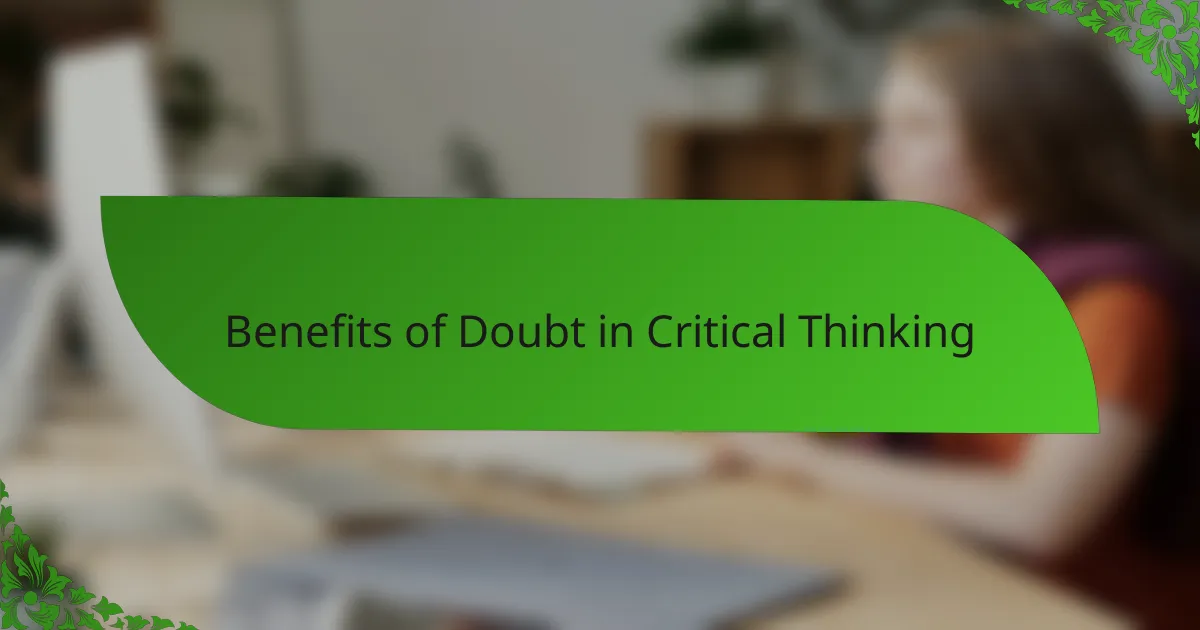
Benefits of Doubt in Critical Thinking
Doubt, I’ve found, acts like a mental workout for critical thinking—it forces us to pause and examine our assumptions rather than accepting them at face value. When I first started questioning my beliefs, it felt uncomfortable, almost like shaking my intellectual balance. But that discomfort was a sign of growth, pushing me to think more carefully and avoid falling into easy traps.
Have you ever caught yourself jumping to conclusions without really thinking things through? Doubt interrupts this autopilot mode and encourages a habit of deeper reflection. From my experience, this leads to clearer, more reasoned judgments because you’re not just reacting, you’re actively analyzing the information before you.
What’s even more interesting is how doubt builds intellectual resilience. When you learn to embrace uncertainty, you’re less likely to get stuck defending weak ideas just because you’re afraid of being wrong. I’ve seen this shift firsthand—it makes conversations richer and your own thinking more flexible, helping you adapt when new evidence emerges instead of clinging stubbornly to old beliefs.
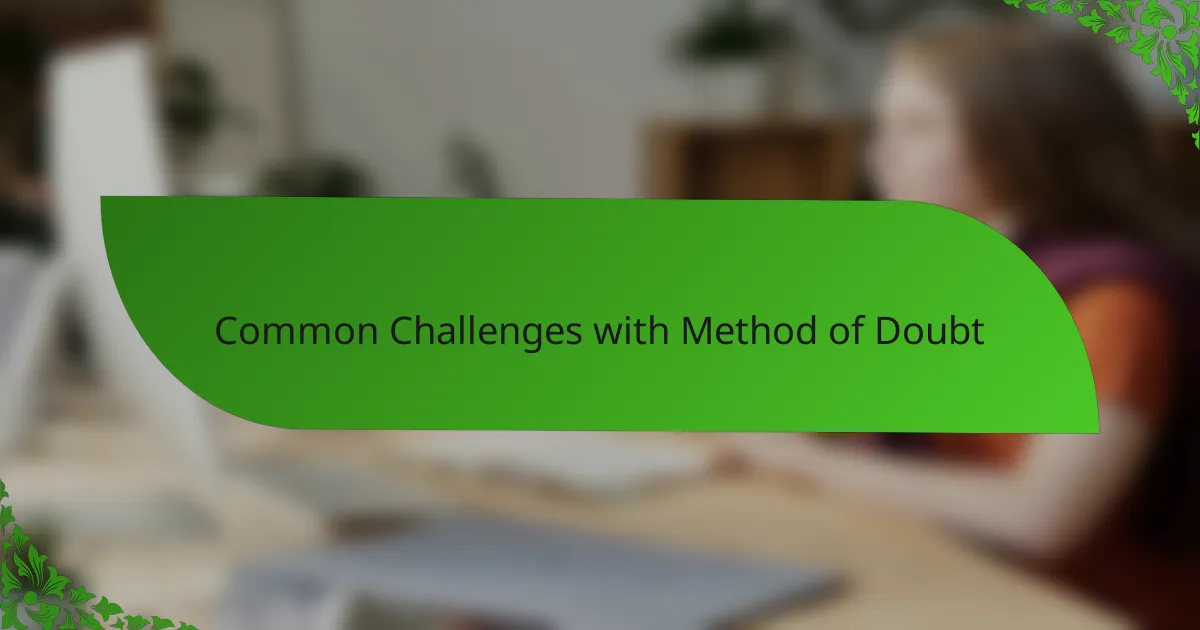
Common Challenges with Method of Doubt
One challenge I often wrestled with in using Descartes’ Method of Doubt is how unsettling it feels to question absolutely everything—even the most basic things my mind relies on. Have you ever tried to doubt your own senses or memories? It’s exhausting and sometimes leaves you feeling lost, as if there’s no solid ground at all.
Another difficulty lies in the risk of falling into skepticism paralysis. I noticed that spending too much time doubting can slow down decision-making and create a kind of intellectual deadlock. How do you move forward when every belief is under attack? Finding the balance between healthy doubt and constructive reasoning took me longer than I expected.
There’s also the emotional toll to consider. Doubting core assumptions can feel isolating and even unsettling, as it challenges not just ideas but personal identity and confidence in knowledge. When I faced this, I had to remind myself that discomfort was part of growth—yet I wonder, how many give up before reaching that breakthrough because doubt feels too threatening?
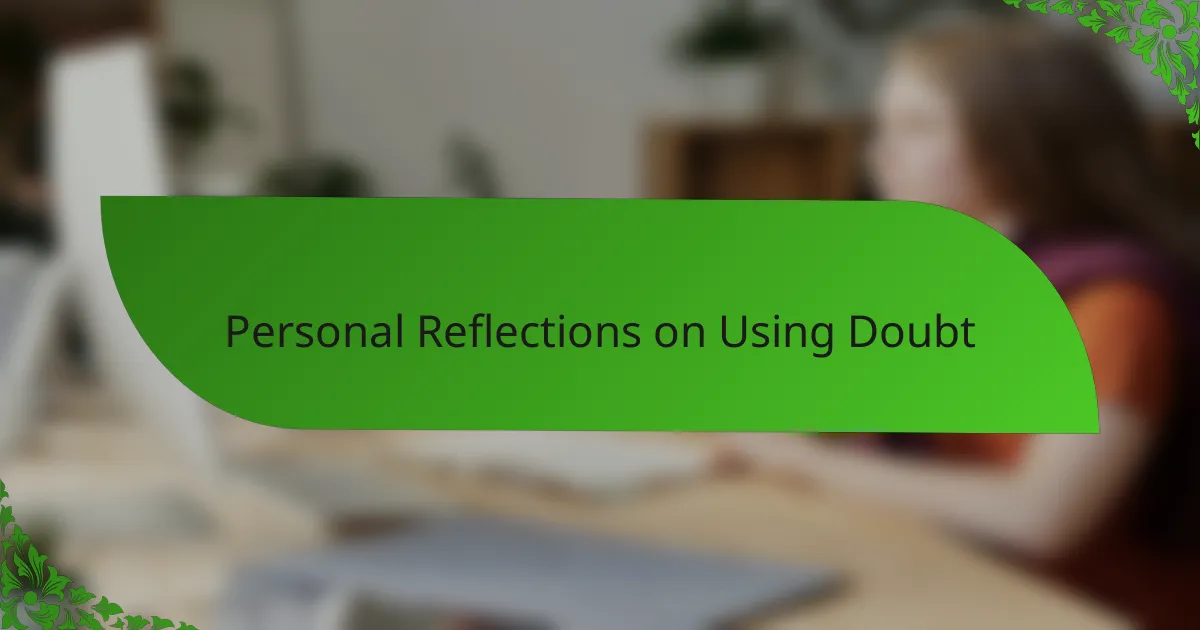
Personal Reflections on Using Doubt
Using doubt as a tool felt strange at first—like opening a door to a room full of questions with no immediate answers. Have you ever hesitated to trust your gut because you wondered if it was just misleading you? That’s exactly how I felt navigating Descartes’ doubt: uncomfortable, yes, but also curious about what might lie beyond that uncertainty.
I recall a moment when I deliberately questioned something as simple as the reliability of my own memory. It was unsettling but also enlightening, revealing how much I usually take for granted. Isn’t it fascinating how doubting something so personal forces you to rethink how you construct your reality?
At times, doubt felt like a double-edged sword—on one hand, it sharpened my critical thinking; on the other, it sometimes made me second-guess myself to the point of hesitation. How do you strike the right balance between healthy skepticism and trusting your reasoning? I’m still working on that, and that ongoing tension makes the journey both challenging and rewarding.